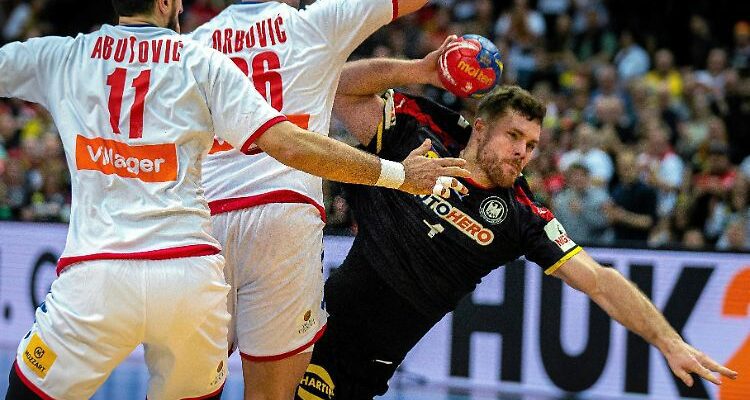Goalkeeper change pays off
DHB team storms into the main round of the World Cup
01/15/2023 7:34 p.m
The German national handball team also wins its second game at the World Cup in Poland. Against the relentless Serbian selection, the offensively strong DHB team falters in the final phase, but thanks to a strong defense it takes the narrow lead over time.
The German handball players passed their first World Cup endurance test and made it into the main round early. Also thanks to the goalkeeper Joel Birlehm, who was outstanding in the second half, the DHB selection prevailed against Serbia with 34:33 (19:17). In the final preliminary round game on Tuesday (6 p.m. / ZDF and in the live ticker on ntv.de) against Algeria, the third win should ensure the optimal number of points for the next phase of the tournament. Left winger Lukas Mertens with seven goals and captain Johannes Golla (6) were the best throwers in national coach Alfred Gislason’s team.
“I think Joel won the game for us today because he saved some important balls in the last few minutes. Unfortunately, we swam a bit in defense,” said Golla on ARD. Gislason was “very happy, we knew what this game meant”. However, he also criticized: “We conceded too many easy goals.”
In front of around 2,500 spectators in Katowice, Poland, the expected thriller developed right from the start. Gislason’s team hardly allowed themselves any weak phases this time. But the experienced opponent never let the DHB selection pull away clearly. The fact that the targeted success was achieved in the end also had something to do with the strong Birlehm. The second key to victory was the almost consistently ideal exploitation of chances.
The DHB selection started the game as they did in the 31:27 win against Qatar: sovereign and concentrated. Andreas Wolff, who has recovered from a strained calf, had difficulties with the shots placed by the Serbs. But otherwise the German defense was stable. And what was even more striking: the own exploitation of chances. Up front, Mertens, Kai Häfner, Golla and Co. used almost every opportunity they had. As a result, Gislason’s team was almost consistently in the lead by two or three goals in the first half.
Birlehm gets stronger the longer the game lasts
The Icelander and his players knew in advance what to expect. Not only internationally experienced players like Petar Djordjic or Lazar Kukic, but overall a lot of rip-off. In fact, the Serbs never faltered throughout the season despite falling behind. The German team could not afford a weak phase like in the second round against Qatar against this opponent. Neither did it. Nevertheless, it remained tight. Because the Serbs have a much higher individual class compared to their opening opponent Qatar.
When Gislason then reacted in a time-out when the score was 11:10 (16 th ) and the defense switched to a more offensive 3:2:1 formation, Germany conceded only one goal within the next nine minutes and, among other things, extended their lead a remarkable Kempa goal by Christoph Steinert up to 16:12. But Serbia, who had defeated Algeria 36:27 at the start, did not let themselves be shaken off and continued to consistently exploit the gaps in the German defense.
“I think we have to be a little more resolute in defense,” demanded DHB sports director Axel Kromer during the break. “Other than that, a two-goal lead at half-time is good.” What Kromer and the rest of the German delegation might have liked: counterattacks and efficiency in front of the opposing goal. The interaction between Knorr and Kreis also worked.
What was missing in addition to a consistently stable defense was a strong goalkeeper performance. Wolff didn’t get into the game as well as he did against the Qataris. Five minutes before the break, Gislason sent the second goalkeeper Birlehm onto the plate. But if the Serbs did something particularly well, it was their placements. At least initially. Because the opponent built after the break. And unlike last time, Germany remained extremely stable. Birlehm became stronger and stronger in goal, and in attack the DHB selection continued to exploit almost every chance they had. Technical mistakes, misses or gaps in defense like against Qatar? Hardly seen this time.
